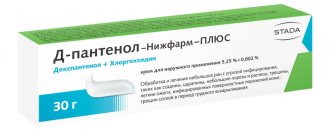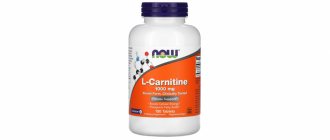- How does Fenkarol for children (10 mg) work?
- What is it used for?
- What is treated with Fenkarol?
- How to give Fenkarol to children?
- Instructions for Fenkarol 10 mg
- Composition of the drug
- Pharmacological properties
- Indications for use
- Directions for use and doses
- Side effects
- Contraindications
- Precautionary measures
- Interaction with other drugs
An allergic reaction in children can be caused by almost anything, this especially applies to infants, whose bodies are just adapting to environmental conditions. For the same reason, it is very difficult to select antiallergic drugs for children, since adverse reactions may occur, but Fenkarol 10 mg has a high safety profile. This is the only antihistamine that can be prescribed to babies from birth.
In what forms is it produced, composition
Fenkarol has two dosage forms:
- white tablets in the shape of a flat cylinder with dosages of 10, 25 and 50 mg of the active ingredient;
- a transparent solution without a specific odor for injections into the muscle, 1 ml contains 10 mg of the main substance.
All varieties of the drug contain quifenadine as the main substance.
The solution additionally contains glutamic acid and water for injection. The tablets contain sucrose, modified potato and corn starches, and calcium stearate.
The tablets are packaged in contour packages with cells of 10 or 15 pieces, one box contains 20 or 30 tablets and instructions.
The solution is packaged in glass ampoules of 1 or 2 ml. One package contains 10 ampoules in a cell plate and instructions.
What therapeutic effect does
According to the instructions, Fenkarol tablets have a therapeutic effect in four areas:
- relieve swelling;
- relieve itching;
- fight other manifestations of allergies - runny nose, lacrimation;
- eliminate increased vascular permeability.
The main purpose of Fenkarol is to reduce the effect of histamine, which is responsible for the development of an allergic reaction. It selectively blocks receptors and activates the production of the enzyme diamine oxidase, which can break down and remove histamine.
After taking the tablets, spasms in the intestines are relieved, itching sensations and skin rashes characteristic of allergies disappear.
At the same time, the medication does not inhibit the functioning of the central nervous system.
The effect of intramuscular administration is achieved after 30 minutes, taking tablets - after 60 minutes.
When and how to take Fenkarol 25 mg tablets?
Fenkarol can be used to treat any type of allergy: food, drug, allergic rhinitis, conjunctivitis and others. Fenkarol 25 mg can be given to children and adolescents 2-3 times a day. On average, the course of treatment lasts 10-20 days.
Find Fenkarol 25 mg in your city's pharmacy
The drug does not cause addiction, drowsiness and does not have a depressing effect on the central nervous system, so it can be taken for a long time without a break, up to 3-3 weeks if necessary.
What is treated with Fenkarol 25 mg
- Hay fever (hay fever)
- Acute and chronic urticaria
- Food allergies
- Rhinoconjunctivitis
- Skin itching, dermatitis, eczema, neurodermatitis
- Drug-induced allergies
- Allergic rhinitis
- Insect bites
- Allergic conjunctivitis
You can buy the product in pharmacies in Minsk and Belarus. The price of the drug Fenkarol 25 mg can be found in the help desk of pharmacies in the country.
Indications for use
The instructions for Fenkarol contain a list of conditions for which the drug can help. Tablets and injections are prescribed by allergists and dermatologists for:
- manifestations of hay fever;
- runny nose of allergic origin;
- urticaria in acute and chronic form;
- angioedema;
- dermatoses (eczema, psoriasis, atopic dermatitis);
- skin itching;
- drug or food allergies.
How does Fenkarol for children (10 mg) work?
An allergic reaction and all its manifestations (runny nose, itching, etc.) appear as a result of the formation of a substance such as histamine in the body.
The medicine blocks the receptors with which histamine tries to interact and stops the development of allergies at the very beginning. The drug begins to act within half an hour after administration. What is it used for?
For the treatment of any type of allergy. From insect bites to dermatitis and hay fever. It is not addictive and can be taken for 3 weeks without interruption.
What is treated with Fenkarol?
- Hay fever (hay fever)
- Acute and chronic urticaria
- Food allergies
- Rhinoconjunctivitis
- Skin itching, dermatitis, eczema, neurodermatitis
- Drug-induced allergies
- Allergic rhinitis
- Insect bites
- Allergic conjunctivitis
Cautions for the use of Fenkarol
The medicine is contraindicated in case of hypersensitivity to the components, in the early stages of pregnancy and lactation. Injections are not given to children and adolescents under 18 years of age.
The medication is used with special care for cardiovascular diseases, pathologies of the liver, kidneys, and gastrointestinal tract.
Adverse reactions from taking Fenkarol are rare. If you are hypersensitive to hifenadine and have existing stomach or intestinal problems, the following may occur:
- a feeling of bitterness in the mouth;
- headache;
- desire to sleep, slow reaction;
- attacks of nausea and vomiting;
- dry mucous membranes.
Unpleasant sensations during the course of treatment require stopping the medication and consulting a doctor.
If it is necessary to operate equipment and work with complex mechanisms, you should be more careful. Contains sucrose.
Instructions for medical use of the drug FENCAROL® 10 mg tablets
Trade name of the drug
FENKAROL® 10 mg tablets International nonproprietary name: quifenadinum (quifenadine).
Composition of the drug
One tablet contains: Active ingredient - hifenadine hydrochloride 10 mg; excipients - sugar, potato starch, calcium stearate.
Release form
Tablets, dosage 10 mg.
general characteristics
Tablets are white or almost white in color with a bevel and a score on one side of the tablet. You can conveniently divide them in half into dosages of 5 mg for children under 3 years of age.
Pharmacotherapeutic group and ATC code
Other antihistamines for systemic use. ATX code: R06AX31
Pharmacological properties
Fenkarol is an antihistamine that reduces the effect of histamine on organs and their systems. Unlike other classical drugs in this group, Fenkarol has a special mechanism of action: the drug blocks histamine H1 receptors in peripheral tissues, and also activates the enzyme diamine oxidase (histaminase), thus reducing the content of histamine in tissues. This explains the effectiveness of Fenkarol for patients whose treatment with other antihistamines is ineffective. Fenkarol is quickly absorbed from the gastrointestinal tract and is found in body tissues within 30 minutes. The maximum concentration of the active substance in the blood plasma is reached after an hour. Fenkarol is metabolized in the liver. Metabolites of Fenkarol and the unchanged portion of the drug are excreted mainly in urine and bile within 48 hours.
Indications for use
Infants and children aged 1 to 12 years Hay fever, acute and chronic urticaria, allergic rhinitis, allergic conjunctivitis, angioedema, allergic skin diseases (atopic dermatitis, eczema), skin itching (against the background of hyperparathyroidism, in the active phase of hepatitis), allergic reactions associated with taking medications or foods.
Directions for use and doses
Fenkarol is taken orally immediately after meals. Infants and children under 1-3 years of age – 5 mg (half a tablet) 2-3 times a day. Children aged 3-7 years – 10 mg 2 times a day. Children aged 8-12 years - 10-15 mg 2-3 times a day. The duration of the course of treatment is 10-15 days. If necessary, the course is repeated. If you miss a dose, take the medicine as soon as you remember, but skip it if it is already time for your next dose. Never take double dosages.
Side effects
Classification of undesirable side reactions by frequency of development: very often (> 1/10); often (> 1/100 to < 1/10); uncommon (> 1/1000 to < 11/100); rare (> 1/10,000 to < 1/1000); very rare (<1/10,000). Nervous system disorders: uncommon - headache, drowsiness. Gastrointestinal disorders: often - dry mouth; infrequently - dyspeptic disorders (nausea, vomiting), which usually disappear when the dose is reduced or the drug is discontinued. If side effects occur, especially those that are not listed in the package insert, you should consult a doctor.
Contraindications
Hypersensitivity to the active substance and/or any of the auxiliary components of the drug.
Overdose
If you suspect an overdose, call a doctor immediately. Symptoms: taking high doses of the drug can cause dry mucous membranes, headache, vomiting, epigastric pain and dyspeptic symptoms. Treatment: it is necessary to provide symptomatic and supportive therapy for the vital functions of the body. There is no specific antidote.
Precautionary measures
Use with caution in severe diseases of the cardiovascular system, gastrointestinal tract, liver and/or kidneys. Fenkarol does not have a depressant effect on the central nervous system, but in some cases a weak sedative effect is observed. The medicinal product contains sugar, so if you are intolerant to any sugars, consult your doctor before using this medicinal product. Use with caution in severe diseases of the cardiovascular system, gastrointestinal tract, liver and/or kidneys. The tablets are not recommended for use in children under 6 years of age, who may have difficulty swallowing. The medicinal product contains sugar, so if you are intolerant to any sugars, consult your doctor before using this medicinal product.
special instructions
Fenkarol does not have a depressant effect on the central nervous system, but in some cases a weak sedative effect is observed. Children whose activities require a quick physical or mental reaction should first determine whether the drug has a sedative effect (by short-term administration). Children who exhibit a sedative effect of the drug are not recommended to engage in potentially hazardous activities during treatment.
Interaction with other drugs
Fenkarol does not enhance the inhibitory effect of alcohol and hypnotics on the central nervous system (CNS). Fenkarol has weak M-cholinergic blocking properties, but with a decrease in gastrointestinal motility, the absorption of slowly absorbed medications may increase (for example, indirect anticoagulants - coumarins).
Best before date
5 years. Do not use the medicine after the expiration date.
Storage conditions
In a place protected from moisture and light at a temperature not exceeding 25 o C. Keep out of the reach of children.
Package
Tablets of 10 pieces are packed in blisters made of polyvinyl chloride film and varnished aluminum foil. 2 blisters (20 tablets) together with instructions (leaflet) for medical use are placed in a cardboard pack.
Conditions for dispensing from pharmacies
Dispensed without a doctor's prescription.
Information about the manufacturer (applicant)
JSC "Olainfarm" Address: st. Rupnicu 5, Olaine, LV-2114, Latvia.
How to use Fenkarol for adults and children
In accordance with the official instructions for use, Fenkarol is used in different regimens depending on the chosen form of the medication, indication and age of the patient.
The solution is used only for intramuscular injections:
- for hay fever: 2 ml twice a day for three days, then give injections for another two days, 2 ml once a day;
- for urticaria and Quincke's edema: 2 ml twice a day for five days, then for another three days, 2 ml once a day.
The maximum permissible amount of quifenadine per injection is 20 mg, per day - 40 mg.
Injections are used to provide emergency assistance in severe allergic reactions. When acute symptoms are relieved, the injections should be replaced with a tablet form.
Fenkarol tablets are taken after meals.
The regimens are the same for all indications, but differ for children and adults.
For adults:
- 50 mg tablets one to four times daily;
- 25 mg tablets two to four times daily.
The choice depends on the severity of the condition and tolerability of the drug. The maximum permissible dose is 200 mg per day. The course of treatment ranges from ten to twenty days. If necessary, therapy can be repeated.
For children:
- 3-7 years - 10 mg tablets twice a day;
- 7-12 years – 10-15 mg two or three times a day;
- adolescents over 12 years of age - 25 mg two or three times a day.
For children, a course of 10-14 days is enough.
How to give Fenkarol to children?
Any antihistamines for children should be given with extreme caution:
- strictly follow the dosage;
- do not violate the regimen;
- make sure the tablets are not expired.
Find Fenkarol 10 mg in your city's pharmacy
Important! Before giving allergy medicine to a baby, you need to crush it into powder and dilute it in a small amount of water at room temperature.
Finding and buying Fenkarol for children in Minsk and other cities of Belarus is not difficult; you can go to any nearby pharmacy near your home. You can find out the price of Fenkarol in advance at the help desk.
Instructions for use of the drug Fenkarol 10 mg tablets
Reviews
Most reviews of Fenkarol are positive. The drug quickly helps with swelling and bronchospasm that occurs due to an allergic reaction, insect bites and hypersensitivity to certain foods. There is good tolerability and no side effects, including in children.
According to experts, the medication does not cause drowsiness or addiction, and is good for treating chickenpox and urticaria. ENT doctors prescribe Fenkarol for swelling of the nasal mucosa after surgery, for adenoiditis and sinusitis.







